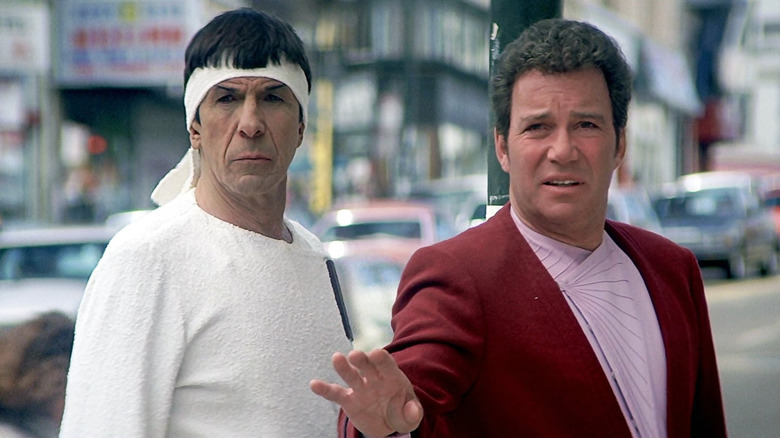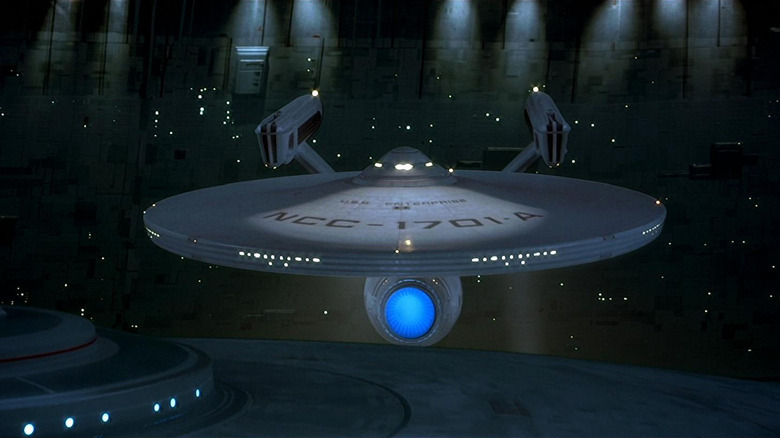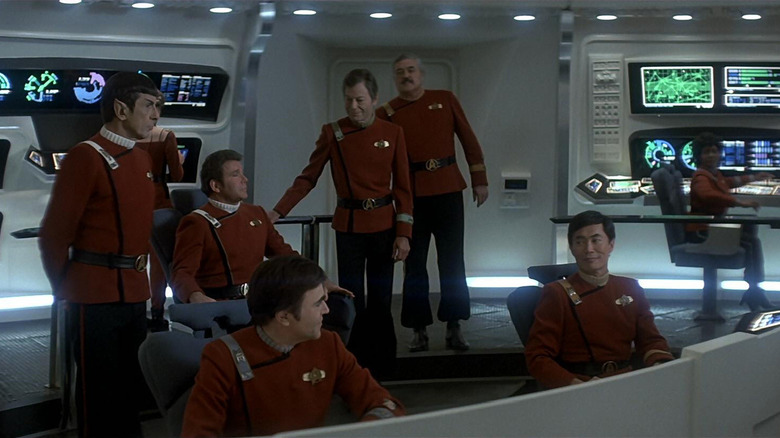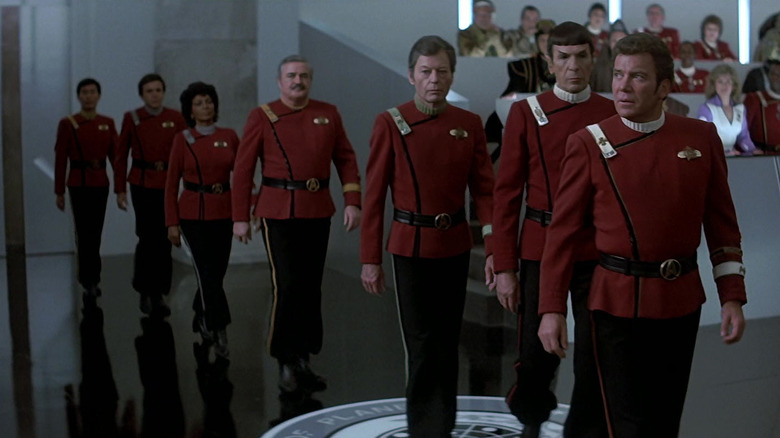Star Trek IV's Happy Ending Has Never Felt Right – Kirk And Co. Deserved Some Punishment
Nicholas Meyer's 1982 film "Star Trek II: The Wrath of Khan," Leonard Nimoy's 1984 film "Star Trek III: The Search for Spock," and his 1986 film "Star Trek IV: The Voyage Home," which have been packaged as a trilogy, all take place over the span of maybe 18 months. The three movies tell a sprawling story, culminating in a somewhat triumphant ending in "The Voyage Home." But that ending is missing something: punishment.
In the first entry in the aforementioned trilogy, Admiral Kirk (William Shatner) is faced with, well, the wrath of Khan (Ricardo Montalbán), a mysterious figure from his past who returns to teach the Admiral about his irresponsible habit of forgetting his promises. Kirk left Khan alone on a distant planet, which, thanks to a solar cataclysm, was quickly reduced to a near-uninhabitable desert.
Kirk had to acknowledge that his past victories might be considered failures and that he might finally be in a scenario he cannot win. While Kirk does eventually best Khan in battle, Spock (Leonard Nimoy) dies in the process. One of the reasons "Star Trek II" is so resonant is because of its sense of loss. It is a victory, but it also isn't. Kirk, we find, is fallible. It seems his final years will be devoted to his humility.
But in "Star Trek III," the characters endeavor to resurrect Spock. It seems Spock implanted his consciousness into the brain of Dr. McCoy (DeForest Kelley), and his body is salvageable thanks to a miraculous terraforming device. All Kirk needs to do is get the two together. To do so, however, Kirk has to steal the Enterprise and run it with a skeleton crew.
Enterprise, eh?
Kirk does manage to unite Spock mind and body again, but in so doing, he destroys the Enterprise. Also, his son dies. Also, the Genesis device — a symbol of life and resurrection — proved to be faulty. Kirk ends up stealing a Klingon ship and hiding out on the Vulcan homeworld. As in "The Wrath of Khan," Kirk wins, but at a terrible cost.
His humility continues.
It seems a pattern has emerged. At the beginning of "The Voyage Home," Kirk and company have been on Vulcan for a while, licking their wounds, repairing their stolen Klingon ship, and preparing for the moment when they'll have to turn themselves in. The characters stole a starship and blew it up, all to rescue one person who was only important to them personally. This is the kind of thing that, in Star Trek, would warrant a court martial. The Trek movies, we see, are an extended exercise in dismantling the mythology of Captain Kirk. He may be heroic and capable, but his youth was reckless. He has reached the point where he must face the music and see a career in decline. This humanization of Kirk is appropriate for the humanist world of Star Trek. There are no myths, there are no masters. Kirk is just as capable of being punished and defrocked as anyone.
Before Kirk can face the music, however, a mysterious sausage-shaped space entity appears over Earth and begins draining its oceans, looking for now-extinct humpback whales. Kirk proposes a rescue mission wherein he goes back in time, picks up some whales, and deposits them in the future, placating the sausage. The film takes place mostly in 1986, and is mostly a fish-out-of-water comedy, with Kirk and co. baffled by the fineries of San Francisco in the '80s.
Everything is hunky-dory
When they return to the future, however, the court martial is still imminent. Their time travel mission notwithstanding, the Enterprise crew did indeed break many rules for which they should be punished.
Instead, they are given a newly built Enterprise-A — identical to the last one — that they are allowed to command. Instead of punishment, they are rewarded. They are given a big round of applause, and Trekkies in the audience can likewise cheer for the characters they love.
That feels ... wrong?
I understand that the Enterprise crew has been put-upon for several films in a row. They have been victorious, but only in small ways. Moreso, they have lost a lot. Spock died, Kirk's son died, the Enterprise died, Genesis died. The world was literally uncreated. Many audiences, perhaps tired of seeing a series of films about death and loss, were likely aching to see a win. After defeating death and going back in time, the Enterprise gets a standing ovation. It was a happy ending to a comedic film about space heroes overcoming odds and having adventures. Kirk is demoted ... to captain. He and his crew can now get right back to status quo.
An arc was interrupted by this happy ending. One might have thought that the "Star Trek" movies were about Kirk's decline as a hero, about him realizing his confidence was misplaced and that his bluster got people hurt. "Voyage" had a golden opportunity to keep the streak going, leaving Kirk ultimately destitute. Starfleet is an organization of protocol and propriety. How fitting if Kirk, willing to face the consequences of his actions, merely accepted his discommendation.
Discommendation
Star Trek often plays well with ambivalence. Every victory has a downside, every solution often leaves behind a tragedy. Throughout Star Trek, the main characters would leave a planet in a lurch, rarely going back to follow up. It wouldn't be until "Star Trek: Lower Decks," a comedy series eager to knock its heroes off a pedestal, that certain bad decisions would be addressed. Like what happened to the Landru planet in "Return of the Archons"? A century after the fact, the denizens just went back to worshiping the computer. How about the drug-addicted Ornarans in "Symbiosis"? Was Picard right to leave them behind? It seems they went through a dark, dark period after Picard "emancipated" them from the Brekkians.
One of the jokes of "Lower Decks" is the insertion of humility into the ordinarily grandiose fabric of Trek. "Star Trek IV" could have used some of that humility. Kirk could easily have ended the film in retirement. He would have been unhappy to have been grounded, but pleased in his life of adventure. For a character so used to victory, it would have been a fitting end. He was victorious, but everything has limits, especially in a structure-oriented organization like Starfleet. The perfect ending for "Star Trek IV" would have been Kirk's retirement, the end of the Enterprise, and the dissolution of the crew. If one had to make a "Star Trek V," Kirk would sit it out.
There's no reason Kirk should not have married Antonia on that faraway ranch and lived in connubial bliss out in the countryside. It was more fitting for the character. Sometimes a seemingly unhappy event can lead to a better, happier ending.



